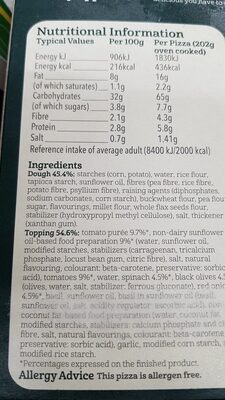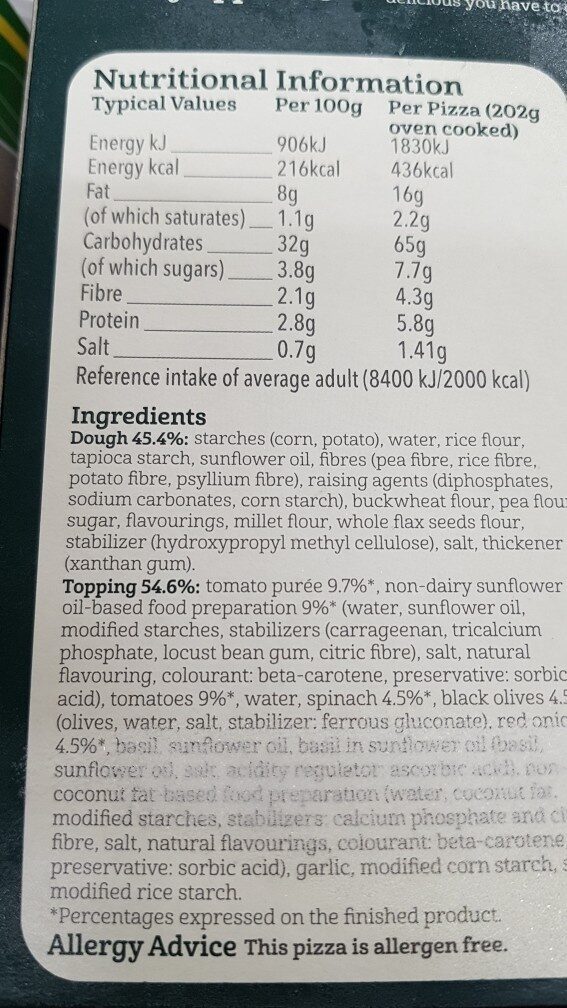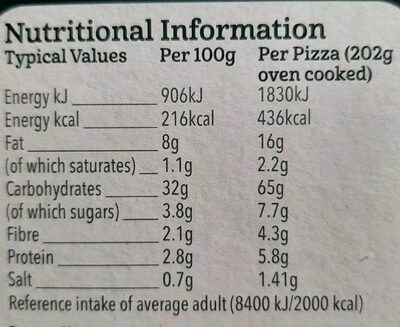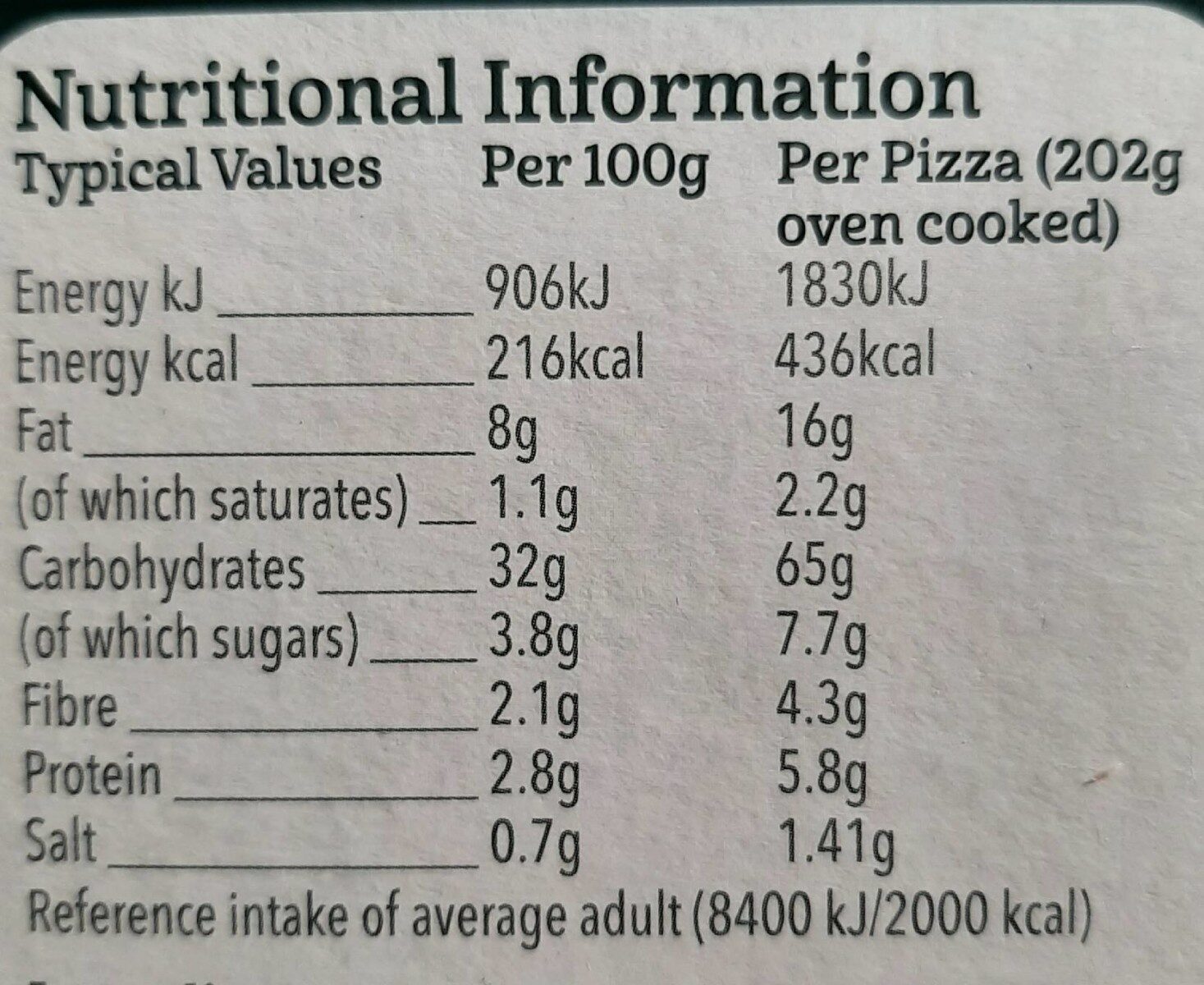Help us make food transparency the norm!
As a non-profit organization, we depend on your donations to continue informing consumers around the world about what they eat.
The food revolution starts with you!
Flatbread pizza
Flatbread pizza
This product page is not complete. You can help to complete it by editing it and adding more data from the photos we have, or by taking more photos using the app for Android or iPhone/iPad. Thank you!
×
Barcode: 5060558350342 (EAN / EAN-13)
Labels, certifications, awards: Vegetarian, Vegan
Countries where sold: United Kingdom
Matching with your preferences
Health
Ingredients
-
76 ingredients
dough 45.4%: starches (corn, potato), water, rice flour, tapioca starch, sunflower oil, fibres (pea fibre, rice fibre, potato fibre, psyllium fibre), raising agents (diphosphates, sodium carbonates, corn starch), buckwheat flour, pea flour sugar, flavourings, millet flour, whole flax seeds flour, stabilizer (hydroxypropyl methyl cellulose), salt, thickener (xanthan gum). topping 54.6%: tomato purée 9.7%*, non-dairy sunflower oil-based food preparation 9%* (water, sunflower oil, modified starches, stabilizers (carrageenan, tricalcium phosphate, locust bean gum, citric fibre), salt, natural flavouring, colourant: beta-carotene, preservative: sorbic acid), tomatoes 9%*, water, spinach 4.5%*, black olives 4.5 (olives, water, salt, stabilizer: ferrous gluconate), red onio 4.5%*, basil, sunflower oil, basil in sunflower oil (bas), sunflower os, ask, acidity regulator ascorbic ac. don coconut fat based food preparation (water, coconut far. modified starches, stabilizers calcium phosphate and cl fibre, salt, natural flavourings, colourant: beta-carotene preservative: sorbic acid), garlic, modified corn starch, modified rice starch. *percentages expressed on the finished product. allergy advice this pizza is allergen free.0
Food processing
-
Ultra processed foods
Elements that indicate the product is in the 4 - Ultra processed food and drink products group:
- Additive: E160a - Carotene
- Additive: E407 - Carrageenan
- Additive: E410 - Locust bean gum
- Additive: E415 - Xanthan gum
- Additive: E450 - Diphosphates
- Additive: E464 - Hydroxypropyl methyl cellulose
- Ingredient: Flavouring
- Ingredient: Thickener
Food products are classified into 4 groups according to their degree of processing:
- Unprocessed or minimally processed foods
- Processed culinary ingredients
- Processed foods
- Ultra processed foods
The determination of the group is based on the category of the product and on the ingredients it contains.
Additives
-
E160a - Carotene
Carotene: The term carotene -also carotin, from the Latin carota, "carrot"- is used for many related unsaturated hydrocarbon substances having the formula C40Hx, which are synthesized by plants but in general cannot be made by animals -with the exception of some aphids and spider mites which acquired the synthesizing genes from fungi-. Carotenes are photosynthetic pigments important for photosynthesis. Carotenes contain no oxygen atoms. They absorb ultraviolet, violet, and blue light and scatter orange or red light, and -in low concentrations- yellow light. Carotenes are responsible for the orange colour of the carrot, for which this class of chemicals is named, and for the colours of many other fruits, vegetables and fungi -for example, sweet potatoes, chanterelle and orange cantaloupe melon-. Carotenes are also responsible for the orange -but not all of the yellow- colours in dry foliage. They also -in lower concentrations- impart the yellow coloration to milk-fat and butter. Omnivorous animal species which are relatively poor converters of coloured dietary carotenoids to colourless retinoids have yellowed-coloured body fat, as a result of the carotenoid retention from the vegetable portion of their diet. The typical yellow-coloured fat of humans and chickens is a result of fat storage of carotenes from their diets. Carotenes contribute to photosynthesis by transmitting the light energy they absorb to chlorophyll. They also protect plant tissues by helping to absorb the energy from singlet oxygen, an excited form of the oxygen molecule O2 which is formed during photosynthesis. β-Carotene is composed of two retinyl groups, and is broken down in the mucosa of the human small intestine by β-carotene 15‚15'-monooxygenase to retinal, a form of vitamin A. β-Carotene can be stored in the liver and body fat and converted to retinal as needed, thus making it a form of vitamin A for humans and some other mammals. The carotenes α-carotene and γ-carotene, due to their single retinyl group -β-ionone ring-, also have some vitamin A activity -though less than β-carotene-, as does the xanthophyll carotenoid β-cryptoxanthin. All other carotenoids, including lycopene, have no beta-ring and thus no vitamin A activity -although they may have antioxidant activity and thus biological activity in other ways-. Animal species differ greatly in their ability to convert retinyl -beta-ionone- containing carotenoids to retinals. Carnivores in general are poor converters of dietary ionone-containing carotenoids. Pure carnivores such as ferrets lack β-carotene 15‚15'-monooxygenase and cannot convert any carotenoids to retinals at all -resulting in carotenes not being a form of vitamin A for this species-; while cats can convert a trace of β-carotene to retinol, although the amount is totally insufficient for meeting their daily retinol needs.Source: Wikipedia
-
E160ai - Beta-carotene
Beta-Carotene: β-Carotene is an organic, strongly colored red-orange pigment abundant in plants and fruits. It is a member of the carotenes, which are terpenoids -isoprenoids-, synthesized biochemically from eight isoprene units and thus having 40 carbons. Among the carotenes, β-carotene is distinguished by having beta-rings at both ends of the molecule. β-Carotene is biosynthesized from geranylgeranyl pyrophosphate.β-Carotene is the most common form of carotene in plants. When used as a food coloring, it has the E number E160a. The structure was deduced by Karrer et al. in 1930. In nature, β-carotene is a precursor -inactive form- to vitamin A via the action of beta-carotene 15‚15'-monooxygenase.Isolation of β-carotene from fruits abundant in carotenoids is commonly done using column chromatography. It can also be extracted from the beta-carotene rich algae, Dunaliella salina. The separation of β-carotene from the mixture of other carotenoids is based on the polarity of a compound. β-Carotene is a non-polar compound, so it is separated with a non-polar solvent such as hexane. Being highly conjugated, it is deeply colored, and as a hydrocarbon lacking functional groups, it is very lipophilic.Source: Wikipedia
-
E200 - Sorbic acid
Sorbic acid: Sorbic acid, or 2‚4-hexadienoic acid, is a natural organic compound used as a food preservative. It has the chemical formula CH3-CH-4CO2H. It is a colourless solid that is slightly soluble in water and sublimes readily. It was first isolated from the unripe berries of the Sorbus aucuparia -rowan tree-, hence its name.Source: Wikipedia
-
E407 - Carrageenan
Carrageenan (E407), derived from red seaweed, is widely employed in the food industry as a gelling, thickening, and stabilizing agent, notably in dairy and meat products.
It can exist in various forms, each imparting distinct textural properties to food.
However, its degraded form, often referred to as poligeenan, has raised health concerns due to its potential inflammatory effects and its classification as a possible human carcinogen (Group 2B) by the International Agency for Research on Cancer (IARC).
Nevertheless, food-grade carrageenan has been deemed safe by various regulatory bodies when consumed in amounts typically found in food.
-
E410 - Locust bean gum
Locust bean gum: Locust bean gum -LBG, also known as carob gum, carob bean gum, carobin, E410- is a thickening agent and a gelling agent used in food technology.Source: Wikipedia
-
E415 - Xanthan gum
Xanthan gum (E415) is a natural polysaccharide derived from fermented sugars, often used in the food industry as a thickening and stabilizing agent.
This versatile food additive enhances texture and prevents ingredient separation in a wide range of products, including salad dressings, sauces, and gluten-free baked goods.
It is considered safe for consumption even at high intake amounts.
-
E450 - Diphosphates
Diphosphates (E450) are food additives often utilized to modify the texture of products, acting as leavening agents in baking and preventing the coagulation of canned food.
These salts can stabilize whipped cream and are also found in powdered products to maintain their flow properties. They are commonly present in baked goods, processed meats, and soft drinks.
Derived from phosphoric acid, they're part of our daily phosphate intake, which often surpasses recommended levels due to the prevalence of phosphates in processed foods and drinks.
Excessive phosphate consumption is linked to health issues, such as impaired kidney function and weakened bone health. Though diphosphates are generally regarded as safe when consumed within established acceptable daily intakes, it's imperative to monitor overall phosphate consumption to maintain optimal health.
-
E464 - Hydroxypropyl methyl cellulose
Hypromellose: Hypromellose -INN-, short for hydroxypropyl methylcellulose -HPMC-, is a semisynthetic, inert, viscoelastic polymer used as eye drops, as well as an excipient and controlled-delivery component in oral medicaments, found in a variety of commercial products.As a food additive, hypromellose is an emulsifier, thickening and suspending agent, and an alternative to animal gelatin. Its Codex Alimentarius code -E number- is E464.Source: Wikipedia
-
E500 - Sodium carbonates
Sodium carbonates (E500) are compounds commonly used in food preparation as leavening agents, helping baked goods rise by releasing carbon dioxide when they interact with acids.
Often found in baking soda, they regulate the pH of food, preventing it from becoming too acidic or too alkaline. In the culinary world, sodium carbonates can also enhance the texture and structure of foods, such as noodles, by modifying the gluten network.
Generally recognized as safe, sodium carbonates are non-toxic when consumed in typical amounts found in food.
-
E579 - Iron gluconate
IronII gluconate: IronII gluconate, or ferrous gluconate, is a black compound often used as an iron supplement. It is the iron-II- salt of gluconic acid. It is marketed under brand names such as Fergon, Ferralet and Simron.Source: Wikipedia
Ingredients analysis
-
May contain palm oil
Ingredients that may contain palm oil: E160ai
-
Vegan
No non-vegan ingredients
Unrecognized ingredients: Dough, Fiber, Rice-fibre, Pea-flour-sugar, Flax, Topping, Non-dairy-sunflower-oil-based-food-preparation, Citric-fibre, Colourant, Black-olives-4-5, Red-onio, Basil-in-sunflower-oil, Sunflower-os, Ask, Acidity-regulator-ascorbic-ac, Don-coconut-fat-based-food-preparation, Coconut-far, Calcium-phosphate-and-cl-fibre, Colourant, Beta-carotene-preservative, Percentages-expressed-on-the-finished-product, Allergy-advice-this-pizza-is-allergen-free-0Some ingredients could not be recognized.
We need your help!
You can help us recognize more ingredients and better analyze the list of ingredients for this product and others:
- Edit this product page to correct spelling mistakes in the ingredients list, and/or to remove ingredients in other languages and sentences that are not related to the ingredients.
- Add new entries, synonyms or translations to our multilingual lists of ingredients, ingredient processing methods, and labels.
If you would like to help, join the #ingredients channel on our Slack discussion space and/or learn about ingredients analysis on our wiki. Thank you!
-
Vegetarian
No non-vegetarian ingredients detected
Unrecognized ingredients: Dough, Fiber, Rice-fibre, Pea-flour-sugar, Flax, Topping, Non-dairy-sunflower-oil-based-food-preparation, Citric-fibre, Colourant, Black-olives-4-5, Red-onio, Basil-in-sunflower-oil, Sunflower-os, Ask, Acidity-regulator-ascorbic-ac, Don-coconut-fat-based-food-preparation, Coconut-far, Calcium-phosphate-and-cl-fibre, Colourant, Beta-carotene-preservative, Percentages-expressed-on-the-finished-product, Allergy-advice-this-pizza-is-allergen-free-0Some ingredients could not be recognized.
We need your help!
You can help us recognize more ingredients and better analyze the list of ingredients for this product and others:
- Edit this product page to correct spelling mistakes in the ingredients list, and/or to remove ingredients in other languages and sentences that are not related to the ingredients.
- Add new entries, synonyms or translations to our multilingual lists of ingredients, ingredient processing methods, and labels.
If you would like to help, join the #ingredients channel on our Slack discussion space and/or learn about ingredients analysis on our wiki. Thank you!
-
Details of the analysis of the ingredients
We need your help!
Some ingredients could not be recognized.
We need your help!
You can help us recognize more ingredients and better analyze the list of ingredients for this product and others:
- Edit this product page to correct spelling mistakes in the ingredients list, and/or to remove ingredients in other languages and sentences that are not related to the ingredients.
- Add new entries, synonyms or translations to our multilingual lists of ingredients, ingredient processing methods, and labels.
If you would like to help, join the #ingredients channel on our Slack discussion space and/or learn about ingredients analysis on our wiki. Thank you!
: dough 45.4% (starches, corn), potato, water, rice flour, tapioca starch, sunflower oil, fibres (pea fibre, rice fibre, potato fibre, psyllium fibre), raising agents (diphosphates, sodium carbonates, corn starch), buckwheat flour, pea flour sugar, flavourings, millet flour, flax, stabilizer (hydroxypropyl methyl cellulose), salt, thickener (xanthan gum), topping 54.6% (tomato purée 9.7%), non-dairy sunflower oil-based food preparation 9% (water, sunflower oil, modified starches, stabilizers (carrageenan, tricalcium phosphate, locust bean gum, citric fibre), salt, natural flavouring, colourant (beta-carotene), preservative (sorbic acid)), tomatoes 9%, water, spinach 4.5%, black olives 4.5 (olives, water, salt, stabilizer (ferrous gluconate)), red onio 4.5%, basil, sunflower oil, basil in sunflower oil, sunflower os, ask, acidity regulator ascorbic ac, don coconut fat based food preparation (water, coconut far, modified starches, stabilizers (calcium phosphate and cl fibre), salt, natural flavourings, colourant (beta-carotene preservative), sorbic acid), garlic, modified corn starch, modified rice starch, percentages expressed on the finished product, allergy advice this pizza is allergen free.0- dough -> en:dough - percent: 45.4
- starches -> en:starch - vegan: yes - vegetarian: yes - ciqual_proxy_food_code: 9510
- corn -> en:corn - vegan: yes - vegetarian: yes - ciqual_food_code: 9200
- potato -> en:potato - vegan: yes - vegetarian: yes - ciqual_food_code: 4003
- water -> en:water - vegan: yes - vegetarian: yes - ciqual_food_code: 18066
- rice flour -> en:rice-flour - vegan: yes - vegetarian: yes - ciqual_food_code: 9520
- tapioca starch -> en:tapioca - vegan: yes - vegetarian: yes - ciqual_proxy_food_code: 9510
- sunflower oil -> en:sunflower-oil - vegan: yes - vegetarian: yes - from_palm_oil: no - ciqual_food_code: 17440
- fibres -> en:fiber
- pea fibre -> en:pea-fiber - vegan: yes - vegetarian: yes
- rice fibre -> en:rice-fibre
- potato fibre -> en:potato-fiber - vegan: yes - vegetarian: yes
- psyllium fibre -> en:psyllium - vegan: yes - vegetarian: yes
- raising agents -> en:raising-agent
- diphosphates -> en:e450 - vegan: yes - vegetarian: yes
- sodium carbonates -> en:e500 - vegan: yes - vegetarian: yes
- corn starch -> en:corn-starch - vegan: yes - vegetarian: yes - ciqual_food_code: 9510
- buckwheat flour -> en:buckwheat-flour - vegan: yes - vegetarian: yes - ciqual_food_code: 9540
- pea flour sugar -> en:pea-flour-sugar
- flavourings -> en:flavouring - vegan: maybe - vegetarian: maybe
- millet flour -> en:millet-flour - vegan: yes - vegetarian: yes - ciqual_food_code: 9555
- flax -> en:flax
- stabilizer -> en:stabiliser
- hydroxypropyl methyl cellulose -> en:e464 - vegan: yes - vegetarian: yes
- salt -> en:salt - vegan: yes - vegetarian: yes - ciqual_food_code: 11058
- thickener -> en:thickener
- xanthan gum -> en:e415 - vegan: yes - vegetarian: yes
- topping -> en:topping - percent: 54.6
- tomato purée -> en:tomato-puree - vegan: yes - vegetarian: yes - ciqual_food_code: 20170 - percent: 9.7
- non-dairy sunflower oil-based food preparation -> en:non-dairy-sunflower-oil-based-food-preparation - percent: 9
- water -> en:water - vegan: yes - vegetarian: yes - ciqual_food_code: 18066
- sunflower oil -> en:sunflower-oil - vegan: yes - vegetarian: yes - from_palm_oil: no - ciqual_food_code: 17440
- modified starches -> en:modified-starch - vegan: yes - vegetarian: yes - ciqual_proxy_food_code: 9510
- stabilizers -> en:stabiliser
- carrageenan -> en:e407 - vegan: yes - vegetarian: yes
- tricalcium phosphate -> en:e341iii - vegan: yes - vegetarian: yes
- locust bean gum -> en:e410 - vegan: yes - vegetarian: yes
- citric fibre -> en:citric-fibre
- salt -> en:salt - vegan: yes - vegetarian: yes - ciqual_food_code: 11058
- natural flavouring -> en:natural-flavouring - vegan: maybe - vegetarian: maybe
- colourant -> en:colourant
- beta-carotene -> en:e160ai - vegan: maybe - vegetarian: maybe - from_palm_oil: maybe
- preservative -> en:preservative
- sorbic acid -> en:e200 - vegan: yes - vegetarian: yes
- tomatoes -> en:tomato - vegan: yes - vegetarian: yes - ciqual_food_code: 20047 - percent: 9
- water -> en:water - vegan: yes - vegetarian: yes - ciqual_food_code: 18066
- spinach -> en:spinach - vegan: yes - vegetarian: yes - ciqual_food_code: 20059 - percent: 4.5
- black olives 4.5 -> en:black-olives-4-5
- olives -> en:olive - vegan: yes - vegetarian: yes - ciqual_food_code: 13184
- water -> en:water - vegan: yes - vegetarian: yes - ciqual_food_code: 18066
- salt -> en:salt - vegan: yes - vegetarian: yes - ciqual_food_code: 11058
- stabilizer -> en:stabiliser
- ferrous gluconate -> en:e579 - vegan: yes - vegetarian: yes
- red onio -> en:red-onio - percent: 4.5
- basil -> en:basil - vegan: yes - vegetarian: yes - ciqual_food_code: 11033
- sunflower oil -> en:sunflower-oil - vegan: yes - vegetarian: yes - from_palm_oil: no - ciqual_food_code: 17440
- basil in sunflower oil -> en:basil-in-sunflower-oil
- sunflower os -> en:sunflower-os
- ask -> en:ask
- acidity regulator ascorbic ac -> en:acidity-regulator-ascorbic-ac
- don coconut fat based food preparation -> en:don-coconut-fat-based-food-preparation
- water -> en:water - vegan: yes - vegetarian: yes - ciqual_food_code: 18066
- coconut far -> en:coconut-far
- modified starches -> en:modified-starch - vegan: yes - vegetarian: yes - ciqual_proxy_food_code: 9510
- stabilizers -> en:stabiliser
- calcium phosphate and cl fibre -> en:calcium-phosphate-and-cl-fibre
- salt -> en:salt - vegan: yes - vegetarian: yes - ciqual_food_code: 11058
- natural flavourings -> en:natural-flavouring - vegan: maybe - vegetarian: maybe
- colourant -> en:colourant
- beta-carotene preservative -> en:beta-carotene-preservative
- sorbic acid -> en:e200 - vegan: yes - vegetarian: yes
- garlic -> en:garlic - vegan: yes - vegetarian: yes - ciqual_food_code: 11000
- modified corn starch -> en:modified-corn-starch - vegan: yes - vegetarian: yes - ciqual_food_code: 9510
- modified rice starch -> en:modified-rice-starch - vegan: yes - vegetarian: yes - ciqual_proxy_food_code: 9510
- percentages expressed on the finished product -> en:percentages-expressed-on-the-finished-product
- allergy advice this pizza is allergen free.0 -> en:allergy-advice-this-pizza-is-allergen-free-0
Nutrition
-
Missing data to compute the Nutri-Score
Missing category
⚠ ️The category of the product must be specified in order to compute the Nutri-Score.Could you add the information needed to compute the Nutri-Score? Add a category
-
Nutrition facts
Nutrition facts As sold
for 100 g / 100 mlEnergy 1,824 kj
(436 kcal)Fat 16 g Saturated fat 2.2 g Carbohydrates 65 g Sugars 7.7 g Fiber ? Proteins 5.8 g Salt 1.41 g Fruits‚ vegetables‚ nuts and rapeseed‚ walnut and olive oils (estimate from ingredients list analysis) 23.2 %
Environment
-
Eco-Score not computed - Unknown environmental impact
We could not compute the Eco-Score of this product as it is missing some data, could you help complete it?Could you add a precise product category so that we can compute the Eco-Score? Add a category
Packaging
-
Missing packaging information for this product
⚠ ️ The information about the packaging of this product is not filled in.Take a photo of the recycling information Take a photo of the recycling information
Transportation
-
Origins of ingredients
Origins of ingredients with a high impact
Origin of the product and/or its ingredients % of ingredients Impact Unknown 100 %High Bosnia and Herzegovina 0 %High
Report a problem
-
Incomplete or incorrect information?
Category, labels, ingredients, allergens, nutritional information, photos etc.
If the information does not match the information on the packaging, please complete or correct it. Open Food Facts is a collaborative database, and every contribution is useful for all.
Data sources
Product added on by kiliweb
Last edit of product page on by roboto-app.
Product page also edited by inf, yuka.sY2b0xO6T85zoF3NwEKvlkNVY9TvpC7kJj_ln0LR5eqLdrvTZvByx5eqL6s.








